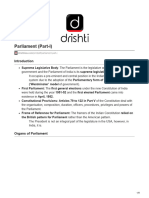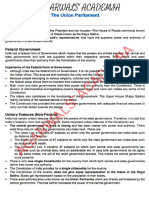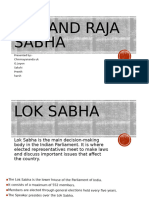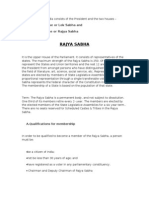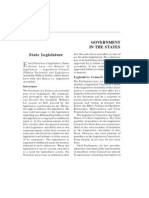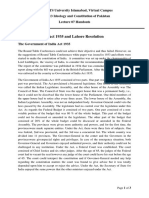0 ratings0% found this document useful (0 votes)
50 viewsThe Parliament of India
The Parliament of India
Uploaded by
jasmeen singhThe Indian Parliament is the supreme legislative body comprising the President and two houses: Lok Sabha and Rajya Sabha. The Lok Sabha is the lower house elected directly by citizens, with a maximum of 552 members who must be at least 25 years old. The Rajya Sabha is the upper house with a maximum of 250 members elected indirectly by state assemblies, who must be at least 30 years old. Both houses consider legislation, with money bills originating in the Lok Sabha, and together the Parliament oversees administration, passes budgets, addresses public grievances, and initiates constitutional amendments.
Copyright:
© All Rights Reserved
Available Formats
Download as PDF, TXT or read online from Scribd
The Parliament of India
The Parliament of India
Uploaded by
jasmeen singh0 ratings0% found this document useful (0 votes)
50 views3 pagesThe Indian Parliament is the supreme legislative body comprising the President and two houses: Lok Sabha and Rajya Sabha. The Lok Sabha is the lower house elected directly by citizens, with a maximum of 552 members who must be at least 25 years old. The Rajya Sabha is the upper house with a maximum of 250 members elected indirectly by state assemblies, who must be at least 30 years old. Both houses consider legislation, with money bills originating in the Lok Sabha, and together the Parliament oversees administration, passes budgets, addresses public grievances, and initiates constitutional amendments.
Original Title
the parliament of india
Copyright
© © All Rights Reserved
Available Formats
PDF, TXT or read online from Scribd
Share this document
Did you find this document useful?
Is this content inappropriate?
The Indian Parliament is the supreme legislative body comprising the President and two houses: Lok Sabha and Rajya Sabha. The Lok Sabha is the lower house elected directly by citizens, with a maximum of 552 members who must be at least 25 years old. The Rajya Sabha is the upper house with a maximum of 250 members elected indirectly by state assemblies, who must be at least 30 years old. Both houses consider legislation, with money bills originating in the Lok Sabha, and together the Parliament oversees administration, passes budgets, addresses public grievances, and initiates constitutional amendments.
Copyright:
© All Rights Reserved
Available Formats
Download as PDF, TXT or read online from Scribd
Download as pdf or txt
0 ratings0% found this document useful (0 votes)
50 views3 pagesThe Parliament of India
The Parliament of India
Uploaded by
jasmeen singhThe Indian Parliament is the supreme legislative body comprising the President and two houses: Lok Sabha and Rajya Sabha. The Lok Sabha is the lower house elected directly by citizens, with a maximum of 552 members who must be at least 25 years old. The Rajya Sabha is the upper house with a maximum of 250 members elected indirectly by state assemblies, who must be at least 30 years old. Both houses consider legislation, with money bills originating in the Lok Sabha, and together the Parliament oversees administration, passes budgets, addresses public grievances, and initiates constitutional amendments.
Copyright:
© All Rights Reserved
Available Formats
Download as PDF, TXT or read online from Scribd
Download as pdf or txt
You are on page 1of 3
THE PARLIAMENT OF INDIA
What is a parliament?
The word 'parliament' comes from the French word parler, which means
'to talk'. A parliament is a group of elected representatives with the power
to make laws. The fundamental concepts of meeting, representation and
legislation - law-making - go back thousands of years.
What are the roles of the parliament?
In modern politics and history, a parliament is a legislative body of
government. Generally, a modern parliament has three functions:
representing the electorate, making laws, and overseeing the government
via hearings and inquiries.
What are the roles of the parliament in a democracy?
In a democracy, the Parliament plays the vital function of deliberating
matters of importance before laws or resolutions are passed. The
Parliament has the power to alter, decrease or increase the boundaries of
states/UTs. The Parliament also functions as an organ of information
ABOUT THE INDIAN PARLIAMENT
Parliament is the supreme legislative body of India. The Indian Parliament
comprises of the President and the two Houses - Rajya Sabha (Council of
States) and Lok Sabha (House of the People).\ Each House has to meet
within six months of its previous sitting. The President has the power to
summon and prorogue either House of Parliament or to dissolve Lok
Sabha.
Qualification for Membership of Parliament
In order to be chosen a member of Parliament, a person must be a citizen
of India and not less than 30 years of age in the case of Rajya Sabha and
not less than 25 years of age in the case of Lok Sabha. Additional
qualifications may be prescribed by Parliament by law.
Functions and Powers of Parliament
As in other parliamentary democracies, the Parliament in India has the
cardinal functions of legislation, overseeing of administration, the passing
of the Budget, ventilation of public grievances and discussing various
subjects like development plans, national policies and international
relations. The distribution of powers between the Union and the States,
followed in the Constitution, emphasizes in many ways the general
predominance of Parliament in the legislative field. A. The Parliament is
also vested with powers to impeach the President and to remove the
Judges of the Supreme Court and High Courts, the Chief Election
Commissioner and the Comptroller and Auditor General by the procedure
laid down in the Constitution.
All legislation requires the consent of both the Houses of Parliament. In the
case of money bills, however, the will of the Lok Sabha prevails. Delegated
legislation is also subject to review and control by Parliament. Besides the
power to legislate, the Constitution vests in Parliament the power to initiate
amendment of the Constitution
THE HOUSES OF THE PARLIAMENT
LOK SABHA RAJYA SABHA
Lok Sabha is the House of People, , Rajya Sabha is the Council of
where people who are eligible to States, where the representatives
are indirectly elected by the elected
vote can elect their representative representative of the Assembles of
by way of direct elections States and Union Territories.
The operation of Lok Sabha The operation of Lok Sabha
continues for 5 years, unless continues for 5 years, unless
dissolved earlier., dissolved earlier.,
Maximum of 552 members Maximum of 250 members
The minimum age for being a The minimum age for being a
member is 25 years. member is 30 years/
The introduction of the Money Bill After the bill is approved in the Lok
takes place only in Lok Sabha. Sabha it is sent to the Rajya Sabha
for consideration.
JASMEEN SINGH CLASS VIII D ROLL NO 14
You might also like
- Safari - 27-Nov-2023 at 4:14 PMDocument1 pageSafari - 27-Nov-2023 at 4:14 PMrishabh1907singhNo ratings yet
- Parliament-Organs, SovereigntyDocument32 pagesParliament-Organs, SovereigntySrijana BhardwajNo ratings yet
- ParliamentDocument17 pagesParliamentPardeep SinghNo ratings yet
- The Indian ParliamentDocument4 pagesThe Indian ParliamentramunagatiNo ratings yet
- lok sabhaDocument2 pageslok sabhasmex48179No ratings yet
- ParliamentDocument14 pagesParliamentMOHD FAIZAN ALINo ratings yet
- Union LegislatureDocument6 pagesUnion Legislaturemamta sehrawatNo ratings yet
- Polity Ebook IIDocument22 pagesPolity Ebook IIAjinkyaNo ratings yet
- About ParliamentDocument4 pagesAbout Parliamentanshita goyalNo ratings yet
- Constitution Assignment: Parliament Composition and Functions !Document28 pagesConstitution Assignment: Parliament Composition and Functions !harshita TMU studentNo ratings yet
- ParliamentDocument6 pagesParliamentsantosh.shukla77077No ratings yet
- The Parliament of IndiaDocument17 pagesThe Parliament of IndiaAbhijeet BhosaleNo ratings yet
- IC- Unit 2Document14 pagesIC- Unit 2Kavya ANo ratings yet
- Why Do We Need A ParliamentDocument4 pagesWhy Do We Need A ParliamentsangwannakshatraNo ratings yet
- La Martiniere Girls' College: Class Viii AssignmentDocument12 pagesLa Martiniere Girls' College: Class Viii AssignmentPalakNo ratings yet
- COI - Unit 3,4Document9 pagesCOI - Unit 3,4LuckyNo ratings yet
- CSE Class 10 Board Exam Questions and AnswersDocument64 pagesCSE Class 10 Board Exam Questions and AnswersRanjit SinghNo ratings yet
- ICSE Class 10 The Union Parliament Lok Sabha and Rajya Sabha NotesDocument7 pagesICSE Class 10 The Union Parliament Lok Sabha and Rajya Sabha NotesRakesh AgarwalNo ratings yet
- Unit 2Document24 pagesUnit 2sachinyadavv13No ratings yet
- State LegislatureDocument7 pagesState LegislaturethatsafreenNo ratings yet
- COI Unit-2Document131 pagesCOI Unit-2vivekaviralrathorecomNo ratings yet
- Unit - 2 CoiDocument17 pagesUnit - 2 Coivarshneytanisha766No ratings yet
- Parliament: Kerala Legislative AssemblyDocument23 pagesParliament: Kerala Legislative Assemblyemil perumattomNo ratings yet
- Indian Constitution WordDocument9 pagesIndian Constitution WordDelphy VargheseNo ratings yet
- ParliamentDocument12 pagesParliamentPrateek SinghNo ratings yet
- The ParliamentDocument6 pagesThe Parliamentaditim1308No ratings yet
- Composition of ParliamentDocument5 pagesComposition of ParliamentKashish RajputNo ratings yet
- Speaker of The Lok SabhaDocument3 pagesSpeaker of The Lok SabhaSoumil BoradiaNo ratings yet
- Legislature and LegislationDocument4 pagesLegislature and Legislationcaman9636sainiNo ratings yet
- Union LegislatureDocument29 pagesUnion Legislatureaaravkumar2809No ratings yet
- STATE LEGISLATURE ProjectDocument7 pagesSTATE LEGISLATURE Projectalhankunal0% (1)
- E-Note 3602 Content Document 20230102055357PMDocument36 pagesE-Note 3602 Content Document 20230102055357PMAshish ShankerNo ratings yet
- Lok and Raja SabhaDocument9 pagesLok and Raja Sabhaharshk.imperial24No ratings yet
- Union LegislatureDocument33 pagesUnion Legislaturesimran jeetNo ratings yet
- IC pptDocument16 pagesIC pptdhairyagarg812No ratings yet
- Civis Chapter 1Document8 pagesCivis Chapter 1furyprimesmefuryNo ratings yet
- Parliamentary System of IndiaDocument2 pagesParliamentary System of IndiaShaaina IbrahimNo ratings yet
- By Sheo Kumar, TGT (SST), K.V. Danapur Cantt. (S.S)Document21 pagesBy Sheo Kumar, TGT (SST), K.V. Danapur Cantt. (S.S)shiv shankarNo ratings yet
- An Us Heel 4Document5 pagesAn Us Heel 4jenniferrasquinhaNo ratings yet
- Central University of Punjab: Seminar ReportDocument12 pagesCentral University of Punjab: Seminar ReportNameNo ratings yet
- Union GovernmentDocument43 pagesUnion GovernmentSuryagayathri SNo ratings yet
- Dr. Ram Manohar Lohiya National Law University, LucknowDocument21 pagesDr. Ram Manohar Lohiya National Law University, Lucknowayush singhNo ratings yet
- NDA Exam: Study Material For PolityDocument6 pagesNDA Exam: Study Material For Politybalasonu745No ratings yet
- Parliament English PDF 87Document6 pagesParliament English PDF 87Adarsh jainNo ratings yet
- Parliament of IndiaDocument15 pagesParliament of IndiasruthymolsNo ratings yet
- The Union ParliamentDocument18 pagesThe Union ParliamentBhavesh BhatejaNo ratings yet
- Analyse The CompositionDocument9 pagesAnalyse The CompositionShivaniNo ratings yet
- Parliament - Study NotesDocument19 pagesParliament - Study Notesninjahattori1220No ratings yet
- Indian Judicial System: Group Member: AryanDocument19 pagesIndian Judicial System: Group Member: AryanAryan RanaNo ratings yet
- Lok Sabha and Rajya Sabha 727822tuad027Document10 pagesLok Sabha and Rajya Sabha 727822tuad027727822tuad027No ratings yet
- Parliament of India: Sansad Bhavan (Parliament House)Document3 pagesParliament of India: Sansad Bhavan (Parliament House)avinasha barikNo ratings yet
- Government in The States State LegislatureDocument12 pagesGovernment in The States State LegislaturegrsrikNo ratings yet
- Constitution of India, Law & Engineering: Assistant Professor Kiet School of ManagementDocument90 pagesConstitution of India, Law & Engineering: Assistant Professor Kiet School of ManagementAASTHA KIETNo ratings yet
- Lok SabhaDocument3 pagesLok SabhaGul GoonNo ratings yet
- Polity 2Document24 pagesPolity 2vishalbharati10230No ratings yet
- Ssee Unit 02Document41 pagesSsee Unit 02NayanNo ratings yet
- Parliament of India Notes PDF 1658294620050Document5 pagesParliament of India Notes PDF 1658294620050Suriya SuriNo ratings yet
- Superfast Revision Civics 2023Document44 pagesSuperfast Revision Civics 2023jcxfpd8k6fNo ratings yet
- Chapter 3 - ParliamentDocument3 pagesChapter 3 - ParliamentDivanshi ShakyaNo ratings yet
- Cumulative Candidate FilingsDocument90 pagesCumulative Candidate FilingsjxmackNo ratings yet
- Guidelines Regarding Uploading of Questions and Answers On The Parliament Question Answer (PQA-RS) System During 263rd Session of Rajya SabhaDocument4 pagesGuidelines Regarding Uploading of Questions and Answers On The Parliament Question Answer (PQA-RS) System During 263rd Session of Rajya SabhaNaveen KumarNo ratings yet
- CBSE - STD. VIII - Civics Notes - Chapter .3 Why Do We Need A Parliament - 25999978Document4 pagesCBSE - STD. VIII - Civics Notes - Chapter .3 Why Do We Need A Parliament - 25999978GauraviNo ratings yet
- Parliamentary and Presidential FormDocument2 pagesParliamentary and Presidential Formarleen SethiNo ratings yet
- Solution For History Test-IIIDocument6 pagesSolution For History Test-IIIMeha ShahNo ratings yet
- Parliament of The United KingdomDocument15 pagesParliament of The United KingdomJannielLintagToledoNo ratings yet
- Functions of Lok SabhaDocument3 pagesFunctions of Lok SabhaArnav Ravinder VNo ratings yet
- News - 174 - Contact M.P Lokshabh PDFDocument16 pagesNews - 174 - Contact M.P Lokshabh PDFMaharshi MadhuNo ratings yet
- HUM113 Handouts Lecture07Document3 pagesHUM113 Handouts Lecture07Evil MadNo ratings yet
- Solutions For Class 11political ScienceDocument5 pagesSolutions For Class 11political ScienceNityapriyaNo ratings yet
- ParliamentDocument12 pagesParliamentPrateek SinghNo ratings yet
- Guidelines - Debate 2024Document2 pagesGuidelines - Debate 2024Jefferson AnchetaNo ratings yet
- The British ParliamentDocument2 pagesThe British ParliamentNesrine BouteldjaNo ratings yet
- Difference Between Lok Sabha and Vidhan SabhaDocument3 pagesDifference Between Lok Sabha and Vidhan SabhaDEEPAK VERMANo ratings yet
- Duuaunausdui: The Union ParliamentDocument15 pagesDuuaunausdui: The Union Parliamentsarah prakashNo ratings yet
- State Goverment Class 7Document8 pagesState Goverment Class 7arnav upadhyayNo ratings yet
- Important Parliamentary TermsDocument6 pagesImportant Parliamentary TermsC.Saharsh ReddyNo ratings yet
- Nehru Report (1928)Document2 pagesNehru Report (1928)AFREEN Z HNo ratings yet
- Bowling NightDocument1 pageBowling NightSunlight FoundationNo ratings yet
- Voting Guide: 2010 General Election Endorsed CandidatesDocument3 pagesVoting Guide: 2010 General Election Endorsed Candidatesjimsmith6820No ratings yet
- Struktur Organisasi UT Tabang 2019:: Site Operation Head Samino Site Operation Head SaminoDocument1 pageStruktur Organisasi UT Tabang 2019:: Site Operation Head Samino Site Operation Head SaminoAinal MuchlisNo ratings yet
- Devices of Parliamentary Proceedings UPSC NotesDocument4 pagesDevices of Parliamentary Proceedings UPSC Notes9966668972No ratings yet
- Barangay Info - Procedures During Sangguniang Barangay SessionDocument1 pageBarangay Info - Procedures During Sangguniang Barangay SessionEdward Mark Dale100% (2)
- The Union Legislature Q-AnsDocument2 pagesThe Union Legislature Q-Ansconnect.amairaNo ratings yet
- What Are The Main Characteristics of Parliamentary System?Document2 pagesWhat Are The Main Characteristics of Parliamentary System?SarthakNo ratings yet
- Parliament & State LegislatureDocument20 pagesParliament & State Legislaturesushant kharbandaNo ratings yet
- CH 5 - NCERT SolutionsDocument3 pagesCH 5 - NCERT SolutionsParv ModiNo ratings yet
- List of Parliament Names and Their CountriesDocument4 pagesList of Parliament Names and Their CountriesMuhammad Farooq100% (1)
- The Indian Parliament - Multiple Choice QuestionsDocument11 pagesThe Indian Parliament - Multiple Choice Questionsanonymous 212No ratings yet
- Grade 8 Why Do We Need A ParliamentDocument4 pagesGrade 8 Why Do We Need A ParliamentShiva Kumar AmbekarNo ratings yet


